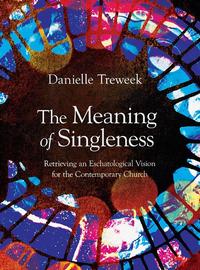 The Meaning of Singleness
The Meaning of Singleness
Danielle Treweek
Ivp Academic 2023
Reviewed by Denise Nicholls
This is a great book! A must read for ministers of the gospel whether engaged, married, single or single again. I say this because so many ministers (myself included) have often longed for and prayed for young families to come to their churches as THIS will see a renewal of our Churches. Further we can either neglect or pay lip service to the Church as THE family of God, when we concentrate our efforts upon the nuclear family as the mainstay and structure of our Churches. Danielle Treweek’s 2024 Australian Book of the Year is a sober reminder of the place of the important and often neglected place of the single Christian disciple in the life of the Church.
Through thorough research on the various positions of single believers since the inception of the Christian Church, to the Patristics, the middle and late medieval church to the present day, Treweek provides us with a very readable book in ten chapters and four parts, navigating the Context, Diagnosis, Theological ‘retrieval’ and finally her own thoughts on the Meaning of Singleness for the evangelical church today.
Singleness in our Christian context relates to believers who are not married, or are divorced or are widowed; it can be a permanent state, a transitory state or one that is revisited. So how do we as the Church of God include within our hearts, minds and our gatherings, the understanding that the Church family is not the nuclear family? Do we, as has occurred historically, regard single disciples as a problem to be managed, a threat to marriages, those who have never really reached true adulthood, are unseen or unnoticed; or, as was once said to me in a conversation about singleness with a minister’s wife, are being disobedient to God’s command to marry and have children.
Whatever your response to these (my own) questions, be assured that reading this book will give you – as it did me – pause for thought regarding how we function as the body of Christ.
Treweek highlights the importance of the Body of Christ to all disciples of the Lord Jesus Christ as the place where our identity is to be firmly located as IN CHRIST – all other designations are secondary to this.
The author points us towards an eschatological and teleological view of the Church, and in particular calls us to the Church’s ‘teleosocial’ (her word) constitution: that we are oriented towards the kingdom of God and the eschaton. Thus, singles and married disciples will have the same eternally social bonds of love and kinship with our Lord, when we meet with Him: “ultimate sociality within the eschaton is not framed by shared biology [or marriage] but by shared union in Christ…” p.238
A highlight for me was the section on Cruciform discipleship, where she states “…singleness is no more inherently sacrificial for the Christian because it is not marriage, that marriage is inherently sacrificial because it is not singleness. Both are goods in their own right, and absence of one does not, by default, render the other to be a sacrifice” (p.260) and again, quoting another author, “… that Christian discipleship is supposed to be costly.” (p.261)
Reading this book as an unmarried person engaged in full time pastoral ministry for over 30 years, I found myself underlining and noting specific examples from my own ministries that exemplified many of Treweek’s observations and revelations from history about the assumptions we as the Church can make about the place and value of single believers. It also challenges me to think more about a couple of terms used by the author of the experience of single Christians, namely of their unique liminal experience and also that of being ‘threshold people’.
This book is a great resource for all ministers of the Word, as we seek to shepherd and serve all of God’s people.
Rev Canon Denise Nicholls is VICAR of the Parish of Banyule, in the Inner North East of Melbourne.
